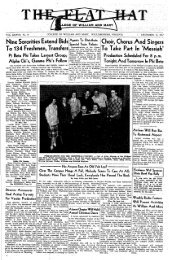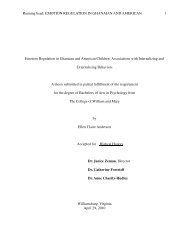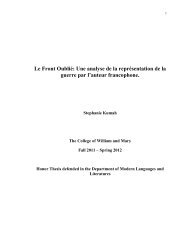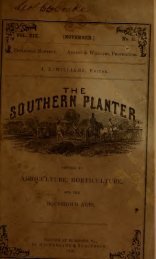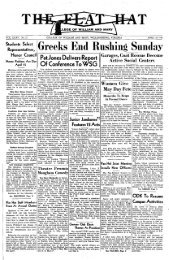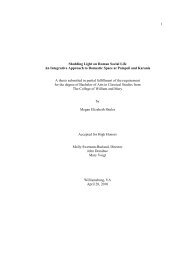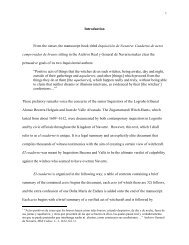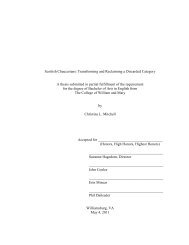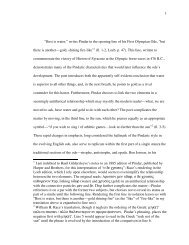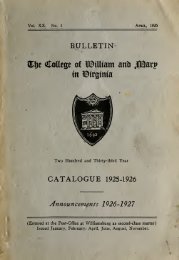Southern planter : devoted to agriculture, horticulture, and the ...
Southern planter : devoted to agriculture, horticulture, and the ...
Southern planter : devoted to agriculture, horticulture, and the ...
You also want an ePaper? Increase the reach of your titles
YUMPU automatically turns print PDFs into web optimized ePapers that Google loves.
THE SOUTHERN PLANTER. 405<br />
From <strong>the</strong> Country Gentleman.<br />
Fatal Disease in Horses.<br />
We published some months since, an account<br />
of a disease in horses, <strong>the</strong>n prevalent in Tennessee,<br />
<strong>to</strong>ge<strong>the</strong>r with an inquiry as <strong>to</strong> its cause<br />
<strong>and</strong> cure, from E. Link, Esq. This was copied<br />
in <strong>the</strong> Spirit of <strong>the</strong> Times, in a late No. of that<br />
paper we find <strong>the</strong> following letter on <strong>the</strong> sub-<br />
ject:<br />
Albuquerque, New Mexico, Aug. 10, 1855.<br />
My Dear Colonel—I cut <strong>the</strong> above notice of<br />
a "Fatal Disease in Horses,'^ from a " Spirit of<br />
<strong>the</strong> Times," published in June of this year.<br />
When I arrived in Albuquerque, in September,<br />
1853, <strong>the</strong> horses of my company were in<br />
very good health. In two or three weeks I<br />
observed that two of <strong>the</strong>m' were attacked, as I<br />
supposed, with blind staggers, <strong>and</strong> I treated<br />
<strong>the</strong>m for that disease. They died in ten hours<br />
after <strong>the</strong>y were first attacked. Shortly afterwards<br />
I observed one of my horses st<strong>and</strong>ing<br />
•with his forehead pressed forcibly against <strong>the</strong><br />
wall of <strong>the</strong> stable. It required great efforts on<br />
<strong>the</strong> part of two or three men <strong>to</strong> drag him away<br />
from <strong>the</strong> wall. The moment he lost <strong>the</strong> support<br />
it afforded, he staggered wildly about<br />
<strong>the</strong> stable, <strong>and</strong> finally fell down <strong>and</strong> died, in<br />
great agony, in two or three hours Shortly<br />
afterwards I observed a horse attacked with a<br />
fit of trembling, as if he experienced some hor-<br />
rible fright. A cold perspiration broke out all<br />
over him, <strong>the</strong> water falling in frequent drops<br />
from his belly <strong>and</strong> flanks. No remedies which<br />
I could devise seemed <strong>to</strong> afford <strong>the</strong> least possible<br />
relief. This horse also died in a few hours.<br />
O<strong>the</strong>rs were attacked in a similar manner <strong>to</strong><br />
those <strong>to</strong> which I have alluded, <strong>and</strong> I never, by<br />
any method of treating which I could glean<br />
from books, or from o<strong>the</strong>rs' experience, succeeded<br />
in saving a single one, until fourteen<br />
had died in about twelve days.<br />
I observed that <strong>the</strong> first symp<strong>to</strong>ms of an approaching<br />
attack which each horse appeared <strong>to</strong><br />
indicate—however Proteus-like in its phases<br />
<strong>the</strong> disease might eventually show itself —was<br />
a frequent shaking of <strong>the</strong> head <strong>and</strong> " flopping"<br />
of <strong>the</strong> ears. Then, generally, in an>^ hour or<br />
two, would commence moving about in' a circle,<br />
if he were left in an open yard—frequently<br />
staggering <strong>and</strong> stumbling in his walk. As his<br />
sufferings became more intense, he would sometimes<br />
beat his head against a wall, until his<br />
eyes would become so swollen as <strong>to</strong> deprive<br />
him completely of sight. The horse never ate<br />
or drank after he became so far gone as <strong>to</strong> walk<br />
about as if on a ring ; <strong>and</strong> I never saw one<br />
that seemed <strong>to</strong> take <strong>the</strong> least notice of passingobjects<br />
after that time.<br />
After failing in every method I could adopt<br />
<strong>to</strong> save even one of <strong>the</strong> fourteen which 1 lost, I<br />
at length got Surgeon Abadie, of <strong>the</strong> Army, <strong>to</strong><br />
dissect <strong>the</strong> head of one which had just died,<br />
with a view <strong>to</strong> discover, if possible, <strong>the</strong> cause<br />
of this sinoiular disease. The vessels of <strong>the</strong><br />
brain were found very much engorged with<br />
blood, <strong>and</strong> a quantity of water was found between<br />
<strong>the</strong> integuments that enveloped it. The<br />
skull was sawn asunder so as <strong>to</strong> expose <strong>the</strong><br />
courses followed by <strong>the</strong> <strong>to</strong>rtuous gallery in<br />
which are situated <strong>the</strong> organs of hearing. In<br />
this gallery, with his head imbedded in <strong>the</strong><br />
tympanum of <strong>the</strong> ear, <strong>and</strong> his body so enlarged<br />
as <strong>to</strong> deprive him of <strong>the</strong> power of retrograding,<br />
even if he had desired <strong>to</strong> *' back out" of his<br />
position, <strong>the</strong> doc<strong>to</strong>r found a large tick. He believed<br />
that <strong>the</strong> horse had died from <strong>the</strong> presenc*^<br />
of this insect, <strong>and</strong> <strong>the</strong> irritation resulting from<br />
his persistent bite. The doc<strong>to</strong>r suggested pouring<br />
a tea-spoonful of sweet oil in<strong>to</strong> each ear of<br />
every horse, <strong>and</strong> <strong>the</strong>n in pouring a tea-spoonful<br />
of a strong decoction of <strong>to</strong>bacco (with, say, a<br />
gill of aqiia ammonia, <strong>to</strong> six gills of <strong>the</strong> decoction,)<br />
also put in<strong>to</strong> each ear of every horse.<br />
This I did as often as once a month for <strong>the</strong><br />
whole of <strong>the</strong> succeeding winter. And from<br />
that time <strong>to</strong> <strong>the</strong> present, whenever I have seen<br />
a single horse holding his head on one side,<br />
<strong>and</strong> "flopping" his ears, I have had <strong>the</strong> whole<br />
number treated in this manner. Since <strong>the</strong>n I<br />
have lost but three horses from this cause, <strong>and</strong><br />
I have had more than a hundred at a time in<br />
my stables, at different periods since <strong>the</strong> fall of<br />
'53. I believe <strong>the</strong> disease alluded <strong>to</strong> by <strong>the</strong><br />
correspondent of <strong>the</strong> "Albany Country Gentleman,"<br />
is <strong>the</strong> same which I had in my stables.<br />
If so, perhaps this communication, which I had<br />
but a few moments <strong>to</strong> scribble off, may be of<br />
some service.<br />
James Henry Carl<strong>to</strong>n, U. S. A.<br />
From <strong>the</strong> Ohio Valley Farmer.<br />
County Court Day at Paris, Ky.<br />
It is a cus<strong>to</strong>m long established in some of<br />
<strong>the</strong> interior counties of Ky., <strong>to</strong> make " County<br />
Court Day" <strong>the</strong> occasion for <strong>the</strong> sale of mules,<br />
cattle, horses, <strong>and</strong> anything else that owners<br />
see proper <strong>to</strong> offer. Upon arriving in Paris<br />
last court day, (1st Monday in April,) I found<br />
<strong>the</strong> streets literally jammed with men, quadrupeds<br />
<strong>and</strong> vehicles. The noise was suggestive<br />
of Babel. Here was an auctioneer upon horseback,<br />
selling a herd of mules, which owners<br />
<strong>and</strong> bidders had surrounded, <strong>and</strong> thus kept <strong>to</strong>ge<strong>the</strong>r.<br />
Near by was ano<strong>the</strong>r auctioneer,<br />
mounted upon a wagon, selling a lot of sewing<br />
machines; far<strong>the</strong>r along a livery stable was<br />
undergoing ih^ vendue ordeal. Scattered at<br />
r<strong>and</strong>om through <strong>the</strong> streets were vendors of<br />
carriages, saddles, bridles, harness, fruit trees,<br />
<strong>and</strong> patent corn <strong>planter</strong>s, which last, as explained<br />
by a native, " drapped <strong>and</strong> kivered<br />
both." Occupying <strong>the</strong> more retired positions,<br />
were representatives from <strong>the</strong> mountain<br />
counties, with white pines, chinkapins, mountain<br />
honeysuckles, <strong>and</strong> tar for sale. The tar<br />
was put up in little kegs, with a view of being<br />
sold direct <strong>to</strong> <strong>the</strong> consumer. I was especially



